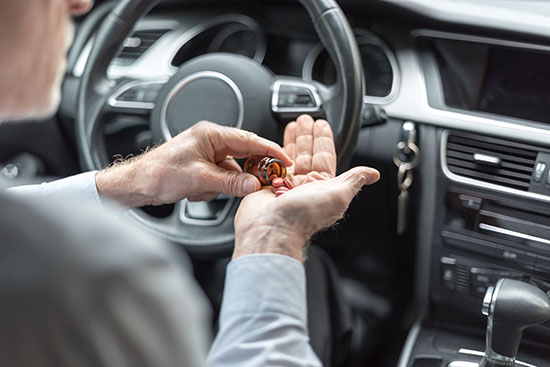Most people associate DUI (Driving Under the Influence) and DWI (Driving While Intoxicated) with drunk driving. While the majority of DUIs in Florida involve alcohol, you can still be charged with DUI even if you’re under the influence of legal substances, such as prescription or over-the-counter (OTC) drugs.
How Prescription and Over-the-counter Drugs Can Affect Driving
You may not realize that even common pain relievers, like acetaminophen or aspirin, can impair your ability to drive. If you look at the warning labels on bottles of Advil, Tylenol, and similar medications, you’ll often see a statement like: “Do Not Drive or Operate Heavy Machinery Until You Know How This Drug Affects You.”
According to the National Highway Traffic Safety Administration (NHTSA), certain prescription and over-the-counter drugs can impair judgment, cause nausea and drowsiness, and reduce coordination. The NHTSA has specifically linked opioids, sedatives, and muscle relaxants to an increased risk of accidents.
Types of Prescription Medications That Can Impair Driving
Many drug-related DUIs involve painkillers and central nervous system depressants—medications often used to treat anxiety, panic attacks, or seizures. These are some of the most commonly prescribed drugs in Florida that can lead to a DUI arrest:
- Vicodin, Lortab, Lorcet (hydrocodone)
- Percocet, Oxycontin (oxycodone)
- Codeine
- Fentanyl
- Ambien
- Lunesta
- Morphine
- Valium (diazepam)
- Xanax (alprazolam)
- Ritalin
How to Determine if Prescription Drugs Are Impairing Your Driving
It’s often easier to determine when you should stop driving after consuming alcohol, but understanding prescription drug impairment is more complicated. Prescription or OTC drugs can remain in your system for up to 24 hours or more, depending on the drug. This makes it difficult to prove impairment using chemical tests since traces of the drug may appear in your system even days after use.
How Prescription Drug DUI Arrests Are Evaluated in Florida
Unlike alcohol-related DUIs, where a breathalyzer test can detect intoxication, there is no simple roadside test to determine if someone is impaired by prescription medications. Instead, law enforcement officers rely on a combination of tests to assess impairment, including:
- Horizontal Gaze Nystagmus (HGN): An eye test that checks for involuntary eye jerking.
- DUI Blood Test: A chemical test to detect drugs in the blood.
- DUI Urine Test: A test to detect substances in the urine.
- Divided Attention Tests: Tasks that require multitasking to assess motor skills and attention.
- Muscle Tone Testing: To determine if muscle control is impaired.
- Observations of Injection Sites: Checking for visible signs of drug use.
The most common way an officer evaluates whether a driver’s faculties are impaired is through a field sobriety test. However, these tests are not always conclusive. In prescription drug DUI cases, Florida law requires a urine or blood test to confirm the presence of drugs in the driver’s system.
This post was written by a professional at Ticket Shield. Ticket Shield understands that life can sometimes throw unexpected challenges your way. That’s why Ticket Shield is here to help you navigate through legal roadblocks when you need it most. Their team of experienced lawyers specializes in a range of traffic-related legal matters, ensuring you have the best defense possible. Types of teams available:
- Traffic Ticket Lawyer
- DUI Lawyer
- Speeding Ticket Lawyer
- Reckless Driving Lawyer
- Suspended License Lawyer
- Red Light Ticket Lawyer
- Stop Sign Ticket Lawyer
- Seat Belt Ticket Lawyer
Don’t let traffic tickets or driving-related charges weigh you down. Contact our Red Light Ticket Lawyer in Broward County today for a free consultation, and let Ticket Shield be your shield in the legal arena. Your peace of mind is their priority!

